European Structural and Investment Funds
European Structural Funds December Newsletter
December 12, 2017 by admin 1 Comment | Category Newsletters
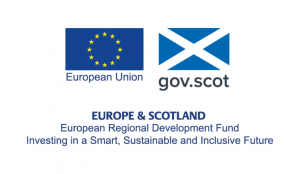
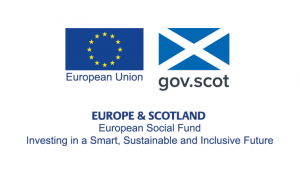

Welcome to our latest European Structural & Investment Funds newsletter. You’ll find a general update from the Managing Authority including news on Smart, Sustainable and Inclusive Growth, a publicity requirements checklist, and our Lead Partner update comes from Glasgow City Council on the 8th City work. If you are not on our mailing list please contact us so you don’t miss out and subscribe to our RSS feeds to receive updates. Keep sending us your case studies, with completed consent form or written permission to use, to include in future newsletters and form part of next year’s publicity plans.
Please send feedback on any of our articles to europeanstructuralfunds@gov.scot

Managing Authority Approval Panels.
In order to ease submission, appraisal and processing of applications MA Approval Panels have been scheduled on a six-weekly basis – rather than the previous quarterly basis, with the first panel in 2018 due to take place on 12th January. The MAAP next meet on 14 December to discuss any new operation submissions and review any change requests requiring MAAP approval.
28 February 2018: Lead Partner event – Glasgow. Venue to be confirmed.
The last lead partner event was well received with many positive comments and constructive feedback received. A summary of the day, including a Q&A, will be published on our website in the next few weeks. Thank you to everyone who attended and who completed the post event survey.
LATEST MANAGING AUTHORITY NEWS
EUMIS AND ESF DATA ENTRY – POINTS TO NOTE
Care is needed when entering and checking the participant details in EUMIS to help processing of claims and to minimise the number of manual changes needed to the database. A detailed check of the information entered into EUMIS has shown the following common errors:
- National Insurance number in the wrong format
- No barriers selected
- Location type ‘Rural’ selected but no barriers selected to explain that selection
- Disabled ‘Yes’ selected but no barriers selected to expand
- ‘Migrants’ not selected but Asylum Seeker &/or Migrant &/or Minority &/or Refugee barrier selected
EUMIS AND ERDF DATA ENTRY – POINT TO NOTE
A detailed check of the information entered on EUMIS has shown the following error:
- Business registration or unique number not being used
GUIDANCE UPDATE
Apprenticeship Levy
The levy affects organisations with a payroll totalling £3m +.
- It is charged at 0.5% of the annual pay bill and started from April 2017.
- All public bodies receive an allowance each of £15,000 before the charge kicks in.
This levy is not eligible for structural funds support as it is a tax on the organisation and ultimately could be used to match-fund similar types of activity attracting European Social Funding.
PHASE 2
2018 represents a significant watershed in the implementation of the current programmes and we need to collectively prepare for the second half in good time ahead of the expected date of exit from the EU. What follows is an outline and it is important to work closely on the detail with your representative contacts in the MA.
2018: Outline Timeline
- Jan to March: Consider strategic intervention and operation extensions
- April to June: Consider new strategic intervention and operation applications
- June to September: Review of position and consider any remaining submissions
EXTENSION OR NEW SUBMISSIONS
Strategic Interventions
MA intends allowing extension of existing SIs to end the programme (2023) provided there are no significant changes to currently approved SI.
Operations
Operations can extend if there is no change in approach. If there is a change to the intervention rate or approach to delivery, we would expect new operation applications.
The end date for operations should be June 2023 to allow time for submission and verification of the final claim.
The Managing Authority will be discussing your phase 2 requirements with you in the coming weeks. We ask all LPs to reflect on progress to date, time needed to compete phase one targets, and what can realistically be achieved and spent during phase 2.
OPERATIONAL PROGRAMME CHANGES
The ERDF changes to the Operational Programme were approved on the 16th November 2017. The main changes are:
- Revision to the scope and indicators under Investment Priority 1b (Promoting business investment in R&I) to allow the Priority Axis to focus on supporting innovation highlighted in the Manufacturing Action Plan and through City Deals alongside other potential infrastructure projects in the transition region.
- Addition of a new Investment Priority for Culture and Heritage in the Highlands and Islands
- Change of intervention rate to 60% for priorities 1,3,4 and 5 in H&I.
Next Steps:
Identifying Lead Partners for the new Strategic Interventions and the best way to deliver the new activity to ensure absorption of funds.
A change to intervention rates for operations where need can be demonstrated. If operations require grant at a higher IR, discuss this with your MA contacts.
The ESF Operational Programme has not yet been approved but we hope this will be confirmed by year end.
N+3 AND CLAIMS PROGRESS
The response to our request to submit claims to minimise the risk of decommitment has gone well, however, the level of errors in claims has meant that not all claims have been paid by the cut off to submit a payment request to the EC. Therefore, we will not meet the N+3 targets and this means a loss of funding to the Programmes.
The change in the exchange rates between GBP and Euro means that this should not reduce the originally planned amount of funding for the programmes, and we will be working with the EC on the refinancing plan required by Regulations. We will continue to process pending claims and urge claims be submitted on a regular basis to ensure we meet 2018 N+3 and performance framework targets to maximise funding allocations to Scotland.
COMMITTEE MEETINGS
The Youth Employment Initiative Territorial Committee, Highland and Islands Territorial Committee and the Joint Programme Monitoring Committee have all met over the last 2 months. The main points of discussion have been around ensuring absorption of funds and speed of delivery. Lead partners have also raised concerns with the current governance structure. The Managing Authority agrees this needs to be reviewed and proposals will be issued in the coming weeks. If anyone would like more information on any of these meetings please contact us.
ANNUAL EVENT
The annual event took place on the 29 November in Edinburgh. Thank you to all our presenters and panel members for their contributions and to everyone who took the time to attend. We had inspiring presentations from Zero Waste Scotland, Skills Development Scotland and from Dr Hepburn as a recipient of the Social Innovation Fund. There wasn’t a dry eye in the room after Dr Hepburn took to the floor and a sincere thank you to her for sharing her story and for the update on the aims of ‘Fearless Femme’ in tackling mental health issues for young women which we wish every success. And last but not least thank you to our two young modern apprentices, Jordanne Currie and Emily Martin, for sharing their apprenticeship experiences which have been positive for both them as individuals and for Leonardo MW. Inspiring to see such confidence and the impact the apprenticeship route can have.
PUBLICITY GUIDANCE – Are you meeting the requirements?

You will know of the minimum requirements in place which must be adhered to when developing and delivering ESIF operations. The following checklist can be used as an aide memoir to ensure beneficiaries are meeting these requirements.
Are the logos
- correct?
- the correct size?
- on all promotional materials?
- Do you have a billboard, plaque or poster visible to the public at your premises? (check what is required on pages 9-12 of Publicity Requirements).
- If on Twitter, are you following @scotgovESIF?
- Do you use the twitter hashtags #structuralfundsscotland and #ESIF?
The Scottish Government’s corporate identity was redesigned in 2016 and this resulted in a change to the European Structural and Investment Funds logos. The most up to date logos should be used on all promotional materials that can easily be amended without additional costs and any new materials or publishing.
You can find our logos on our logos webpage.
If you would like to receive our Toolkit for quick access to some useful and regularly used links please email us at europeanstructuralfunds@gov.scot. A webpage with the toolkit will be created in due course.
GROWTH TEAM UPDATES

SMART GROWTH
Smart Growth supports investment in SMEs, business competitiveness and innovation, enhancing skill levels linked to key growth sectors and helping young people into employment.
SME Holding Fund
A total of £50.1m ERDF has been approved for the SME Holding Fund to provide access to finance for SMEs to enhance their business competitiveness and to increase their R&D and innovation capacity. The fund has been very active with higher than expected levels of demand for equity funding leading to an additional award of ERDF. The Lead Partner is currently looking to increase investment activity in the Highlands and Islands area. To date 6 business competitiveness claims and 1 innovation claim have been paid to the SME Holding Fund with a further business competiveness claim submitted.
Business Competiveness
A total of £27.6m ERDF has been approved for Scottish Enterprise, Highlands and Islands Enterprise and the Local Authorities to deliver business growth support across Scotland. Although there were some initial delays to activity commencing this is now well underway with a variety of support being delivered to businesses with growth potential to help them to grow and internationalise. To date a total of 5 business competitiveness claims have been paid with a further 12 claims submitted. First claims are taking longer to process and pay as Lead Partners adapt to the requirements of the new Management and Control System and the increased level of checking.
Innovation
A total of £12.1m ERDF has been approved for Scottish Enterprise and Highlands and Islands Enterprise to deliver innovation support to SMEs across Scotland. Commitment levels for Innovation activity are lower at this stage of the Programme although the Review has identified areas of demand which should significantly increase commitment levels for the second phase of the Programme. After a slow start activity is now being delivered to SMEs across Scotland to enhance their innovation capacity. To date only 1 innovation claim has been submitted.
Developing Scotland’s Workforce
A total of £27.6m ESF has been approved for the Scottish Funding Council and Skills Development Scotland to deliver higher level skills linked to key growth sectors and further apprenticeship places across Scotland. This activity is now well underway with the Lead Partners delivering additional college learning places linked to growth sectors, additional modern apprenticeship places, work-based learning through foundation apprenticeships and advanced academic and work-based education through graduate apprenticeships. To date 1 claim has been paid and a further 2 claims have been submitted.
Youth Employment Initiative
A total of £59.1m ESF has been approved for Scottish Funding Council and the Local Authorities to deliver the Youth Employment Initiative in South West Scotland. This funding is delivering additional college learning places and employer recruitment incentives aimed at integrating young people into the labour market. To date 4 claims have been paid and a further 6 claims have been submitted.

INCLUSIVE GROWTH
Claims
A number of delivery claims relating to Employability and Social Inclusion & Poverty have been submitted on EUMIS following the successful introduction of the CVS file interface. The Managing Authority is currently working with Lead Partners to ensure these claims are verified, processed and paid as quickly as possible to assist with the achievement of N+3 targets. Lead Partners are encouraged to ensure that further catch-up claims are submitted as soon as possible after previous claims have been processed.
Some Lead Partners are still experiencing problems when using the web interface and, where this occurs, please contact the MA for support. Lead Partners can consider using the CSV file interface in the interim so that a catch-up claim can be submitted and processed by the end of the year.
Verifications
A common issue relating to the verification of participant milestone achievements has centred around the incorrect use of ESF logos on participant records. Lead Partner must ensure that:
- The correct logo has been used e.g. ESF not ERDF;
- The most up-to-date version of the logo has been used;
- The logo is the correct size.
In addition, Lead Partners should ensure that all registration forms include a clear statement that makes the participant aware that they are receiving ESF support. Guidance relating to both verifications and publicity requirements is available on the ESIF Division website:
Participant Guidance – Annex
The Managing Authority has processed a number of verifications relating to participant milestone achievements and it has become apparent that the original Participant Guidance document has been misinterpreted by Lead Partners. It has therefore been agreed that the Managing Authority will consider using a common sense approach to verifying documentation relating to participants registered in 2015 and 2016 by accepting a wider variety of documentation to justify that the participant is both eligible for support and can evidence the achievement being verified.
The Lead Partner should still refer to the main Participant Guidance document in the first instance and thereafter use the Annex, where the common sense approach is required for participants registered in 2015 and 2016.
The attached Annex sets out the types of documentation that the MA will accept:
ESF Participant Guidance – Annex
The Annex will eventually be added to the existing Participant Guidance, however, the guidance is currently being revised (to take account of other required changes) and a re-issued version will only be formally published on the ESIF website once all revisions have been agreed.
Please read the Annex carefully and ensure that all points are considered when providing documentation relating to the verification of participant achievements.
If you have any queries, please do not hesitate to get in contact with your Portfolio & Compliance Manager.

SUSTAINABLE GROWTH
There continues to be good progress in the Sustainable Growth Strategic Interventions, with more grant funding and application rounds launched over the past few months and claims and achievements beginning to settle into a more standard schedule.
ESF staff have had the chance to meet some of the grant recipients supported through the Circular Economy and Climate Challenge Fund at the Scottish Resources Conference in September, and in early November at the Climate Challenge Fund Gathering. Some really interesting and exciting projects, ranging from community based projects with ambitious targets around making a difference to their carbon footprint to plastics made out of waste crustacean shells.
Speaking at the Scottish Resources Conference the Cabinet Secretary for the Environment, Climate Change and Land Reform, Roseanna Cunningham, announced £4.2M of funding from the ERDF supported Circular Economy Investment Fund, being delivered by Zero Waste Scotland. This funding will help 17 SMEs develop new products including improving efficiency in re-using whisky by-products, waste plastic and household furniture.
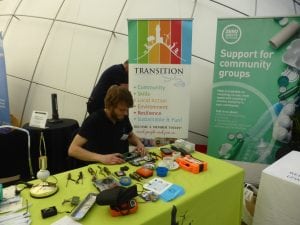
https://www.transitionstirling.org.uk/
https://www.transitionstirling.org.uk/gallery/
This theme continues as Transport Scotland launched the second Round of the Low Carbon Travel and Transport Challenge Fund at the end of October. Providing support to Active Travel Hubs and Low Carbon Transport Hubs, this Round will see ERDF matched with additional Transport Scotland funding to make the Challenge Fund as accessible as possible, particularly addressing some of the challenges around securing match funding that we have seen over the past year or two. Please follow this link to for more details on the Challenge Fund.
The Green Infrastructure Challenge Fund expects to see the launch of its third Challenge Fund Round early in the new year, hoping to see projects coming forward from the Highlands & Islands. ERDF is also supporting improvements in mobile data and fibre broadband in some of the more remote areas in Highlands & Islands, planning and development of this programme of work continues and we hope to see activity on the ground underway at some point in 2018.
Partners in the Smart Cities SI have also been working hard and some of the projects are starting to see real results. This includes the Open Data work package, which recognised that prior to the 8th City programme, out of Scotland’s seven cities only Edinburgh and Glasgow had invested in the development of an Open Data Platform to publish and manage open data on the Web. These Open Data Platforms are now being developed across other cities, the joint approach to procuring, designing and implementing the platforms has generated substantial benefits; allowing the cities to pool their development costs together on a single shared technology base to improve the platform’s functionality. Doug Young, Open Data co-ordinator, Perth and Kinross Council, said “This was an exciting opportunity for co-work and co-design between the cities, which is not only in the spirit of the 8th City programme’s goals, but also facilitates the process of federating and combining datasets between the cities moving forwards”.
LEAD PARTNER UPDATES
ERDF: 8th City Programme – Glasgow City Council
The ‘Scotland’s 8th City – the Smart City’ ERDF Strategic Intervention is an ambitious programme of collaborative innovation across Scotland’s cities of Aberdeen, Dundee, Edinburgh, Glasgow, Inverness, Perth, and Stirling.

By working together the seven cities have bought into a vision to make cities more attractive, liveable and resilient through data and digital technology.
The ‘8th City’ programme is being progressed via ‘Phase 1’ ERDF grant of £10M enhanced by Scottish cities match funding (including Cities Investment Fund) of approximately £14.5M to create a £24.5M programme of Smart City projects across all cities. It is anticipated that a similar level of support may be available to support Phase 2 of the programme, running from 2019 to 2022.
The 8th City programme currently includes 29 different projects, with a focus on both investment in infrastructure and support for pilots and trials, in support of the following work clusters:
- Open Data
- Smart Communities / Mobile Working
- Smart Energy
- Smart Mobility
- Smart Waste
- Smart Services: Public Safety
- Smart Infrastructure: Innovation Labs
- Smart Infrastructure: Intelligent Street Lighting
- Smart Infrastructure: Water Management
Collaboration is key to this Strategic Intervention with all seven cities working to develop projects which, at their heart, are open, interoperable, scalable, and replicable. The cities are also committed to knowledge exchange, sharing of experiences and learning, mutual support, and sharing of assets.
One example of this joint working is the ‘Smart Communities / Mobile Working’ project being developed in Glasgow. Supported by ERDF grant of £972,750 and Glasgow City Council match funding of £1,465,000, this project is transforming mobile services for almost 3,000 staff working across social care and bulk uplift services. The process to develop these services includes a focus on business analysis, coding and design, visualisation, and business engagement. This approach has been shared with partners across the 8th City programme – with at least one other Scottish city now also committed to working on a Smart Communities / Mobile Working project.
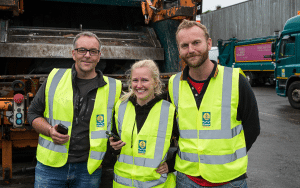
By engaging collaboratively on the 8th City programme, Scotland’s cities are also working in partnership to enhance their ‘Smart City’ status – globally recognised as a key attractor for investors. The new technologies being developed and adopted by the cities will help improve air quality, traffic flow, cut pollution and allow planners to gain insight into the way each city works, which will in turn improve the quality of life for everyone who lives and works in the cities.
Scottish cities are working within the framework of the Scottish Cities Alliance – a partnership of the seven cities and Scottish Government. Glasgow is the Lead Partner for the 8th City ERDF Strategic Intervention and, as Alliance lead for the ‘Smart and Sustainable’ theme, is well placed to take on this role.
The 8th City Programme Management Office is based within Glasgow City Council and can be contacted at 8th_city_pmo@glasgow.gov.uk.
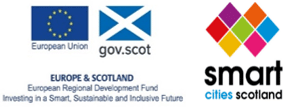
And finally, on behalf of everyone here at European Structural and Investment Funds we would like to wish you a Merry Christmas and a happy New Year!

Liking this page, very well laid out and informative.